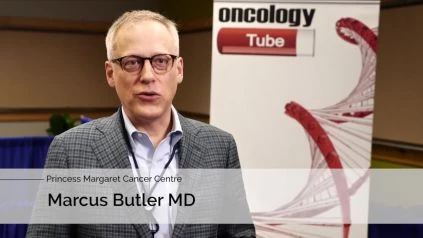Marcus Butler, MD of Princess Margaret Cancer Centre discusses the ILLUMINATE 301 A randomized phase 3 study of tilsotolimod in combination with ipilimumab compared with ipilimumab alone in patients with advanced melanoma following progression on or after anti-PD-1 therapy
Background: Tilsotolimod (IMO-2125) is a Toll-like receptor (TLR) 9 agonist with potent immunostimulating activity. In an ongoing Phase 1/2 clinical study in patients with advanced melanoma who progressed on or after anti-PD-1 therapy (NCT02644967), intratumoral (IT) tilsotolimod with ipilimumab was well-tolerated, demonstrating durable responses (including complete response > 21 months), dendritic cell activation, type I interferon response, CD8+ T-cell proliferation in responders, and an abscopal effect. Methods: ILLUMINATE 301 (NCT03445533) is a randomized phase 3 global, multi-center, open-label study of IT tilsotolimod (8 mg) in combination with ipilimumab (3 mg/kg) versus ipilimumab monotherapy in patients with advanced melanoma and progression on or after anti-PD-1 therapy. Eligible patients are ?18 years with histologically confirmed unresectable Stage III or Stage IV melanoma, ?1 measurable lesion accessible for injection (superficial or visceral, the latter with image guidance), ECOG PS ?1, and adequate organ function. Exclusion criteria include prior TLR agonists, prior ipilimumab (except adjuvant ?12 weeks before progression), and CNS disease other than stable brain metastases. Patients are randomized 1:1 and stratified by duration of prior anti-PD-1 (?12 weeks vs <12 weeks), stage (M1c vs other), and BRAF status/prior targeted therapy (TT) (BRAF wildtype vs BRAF mutation+ with TT vs BRAF mutation+ without TT). Primary endpoints are overall response rate (RECIST v1.1) by independent central review and overall survival. Secondary endpoints include durable response rate, time to response, progression-free survival, patient-reported outcomes, and safety. Patients are enrolling at sites in the United States, European Union, Australia, and Canada. References: (1) Haymaker C. Society for Immunotherapy of Cancer Annual Meeting, November 2017, National Harbor, MD; (2) Diab A, et al. European Society of Molecular Oncology Annual Meeting, October 2018, Munich, Germany. Clinical trial information: NCT03445533

